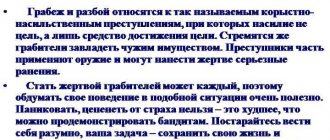The current criminal legislation in Russia divides all crimes into two types: completed and unfinished. In the most general sense, the difference between them lies in a socially dangerous consequence that does not occur if the crime is not completed. In practice, it is sometimes difficult for law enforcement officials to attribute a specific act to any type and determine whether a consequence has occurred. Therefore, for the theory of criminal law, the study of unfinished crimes is of significant interest.
The concept and types of unfinished crime
Criminal law distinguishes three stages of an intentional crime: preparation, attempt and completed crime. They are understood as certain stages in the development of criminal activity, which differ in the nature, volume of actions performed (the degree of expression of the objective side of a particular crime) and the moment of cessation of criminal behavior. The stages reflect different degrees of implementation of a person’s criminal intent, which in turn affects the different degrees of social danger of the attack.
The stages, as a physical (objective) stage of human behavior, are preceded by a psychological stage, at which, taking into account various factors, certain motives are formed that prompt a person to act or inaction. In the theory of criminal law, this mental process in relation to a crime is called the formation of intent. Not manifested externally, i.e. not having its own objective expression, this stage is outside the scope of criminal law regulation. This statement is true because in criminal law the principle of responsibility for an act operates. For the same reason, “discovery of intent” is not punishable. The detection of intent is not socially dangerous, since it is not capable of causing harm to social relations protected by law and has a preventive rather than criminal legal significance.
Detection of intent should be distinguished from statements by persons containing threats or calls that are signs of a number of crimes, for example: threat to kill (Article 119 of the Criminal Code of the Russian Federation); public calls for extremist activities (Article 280 of the Criminal Code of the Russian Federation), etc. These cases are classified as completed crimes.
In accordance with Article 29 of the Criminal Code of the Russian Federation, preparation for a crime and attempted crime are recognized as unfinished crimes. In the theory of criminal law, these two stages are also usually united by the concept of “preliminary criminal activity.” In Part 1 of Art. 29 of the Criminal Code of the Russian Federation, a completed crime is an act that contains all the elements of a crime provided for by a specific article of the Special Part of the Criminal Code.
As previously noted, the stages of preparation for a crime and attempted crime pose a public danger, and therefore, the basis for criminal liability for their commission is the corpus delicti of an unfinished crime. The identification of stages in criminal law is a reflection of objective reality; their delimitation is based on the disclosure of objectively existing, and not consciously introduced, boundaries between these stages.
Preparation for a crime is an activity aimed at creating conditions that make it easier for the offender to subsequently commit a crime. In turn, an attempt is an act (action or inaction) directly aimed at committing a crime, but which was not completed due to circumstances beyond the control of the perpetrator.
What is the basis for bringing to criminal responsibility a person who did not complete the crime he started? In the science of criminal law, there are different approaches to solving this problem. The point of view of Professor N.D. seems convincing. Durmanov, who rightly pointed out that the crime includes all the signs outlined in the articles not only of the Special, but also of the General Part of the Criminal Code of the Russian Federation. In accordance with this, in the current legislation the content of Art. 30 is the legal basis for bringing to criminal liability persons who did not complete the crime due to circumstances beyond their control (Part 3 of Article 29 of the Criminal Code of the Russian Federation).
Stages may not occur when committing all crimes. This possibility is limited by a number of objective and subjective characteristics.
In Article 30 of the Criminal Code of the Russian Federation in parts 1 and 3, the legislator indicates the intentional nature of guilt when carrying out preliminary criminal activity. It should be noted that intent can only be direct. Preparation and assassination attempt are always conscious and purposeful activities. The person is aware of the socially dangerous nature of his behavior, desires and strives to achieve a criminal result.
On the objective side, stages are generally accepted as possible in crimes with a material element, regardless of the form of the act (action or inaction), and in crimes with a formal element, the possibility of an attempt is excluded if the act is committed by inaction, since the moment of the beginning of the latter already forms the completed crime.
The identification of stages is legally justified only when the person’s activity is stopped at the stage of preparation or attempt, but if the perpetrator, having undergone preparation for the crime, subsequently, while committing it, achieved a criminal result, there are signs of a completed crime, which absorbs all previous stages.
Establishing the stage of commission of an intentional crime has important practical significance. This is determined by the fact that when assigning punishment to a guilty person for an act he has committed, it is necessary to take into account the degree of social danger of the act. The assessment of the latter depends, among other things, on the stage at which the criminal activity was stopped. According to general recognition, enshrined in law today, an attempt is more dangerous than preparation, and a completed crime is more dangerous than an attempt, and therefore, each subsequent stage entails a more severe punishment.
The doctrine of the stages of committing an intentional crime is based on the objective process of human behavior, which goes through certain stages in its development: the formation of a plan, the creation of conditions for its implementation, the actual actions and the achievement of the desired result. For educational purposes, the question of the stages of committing a crime must be studied in the following order: 1. Preparation for a crime; 2. Attempted crime; 3. Completed crime.
Commentary to Art. 29 Criminal Code
1. An unfinished crime includes the stages of preparation for a crime and attempted crime; the commission of a crime ends with the stage of a completed crime.
2. The question of preparation and attempt can arise only in relation to crimes committed with direct intent and purposeful nature. The possibility of preparation and attempt due to negligence and indirect intent is excluded.
Preparation and attempt are impossible in some crimes, where the resulting consequences are a sign that distinguishes a criminal act from an administrative offense, disciplinary offense, etc. (for example, Articles 171, 285, etc. of the Criminal Code). In such cases, the absence of criminal consequences excludes the question of the criminal liability of a person, although he may be subject to administrative or disciplinary liability for the actions committed.
Preparation and attempt cannot take place in the so-called torts of creating danger (part 1 of article 215, part 1 of article 217, etc. of the Criminal Code).
3. The qualification of an unfinished crime must be carried out with reference to the specific part of Art. 30 of the Criminal Code (part 1 for preparation and part 3 for attempt, respectively); failure to indicate part of Art. in procedural documents. 30 of the Criminal Code is a violation of the criminal procedural law, and in the case of a sentence, it is the basis for its cancellation.
Preparing for a crime
The current criminal law (Part 1 of Article 30 of the Criminal Code of the Russian Federation) defines preparation for a crime as the search, manufacture or adaptation by a person of means or instruments for committing a crime, the search for accomplices to a crime, conspiracy to commit a crime or other deliberate creation of conditions for the commission of a crime, if at the same time the crime was not completed due to circumstances beyond the control of this person.
Preparation is any intentional, that is, conscious, purposeful activity that creates conditions for the commission of a crime in the future, but is not realized into a completed crime due to circumstances beyond the will of the perpetrator. Preparatory actions differ from the detection of intent in that there are already specific actions, and not intentions to commit a crime. Preparation differs from the next stage of an intentional crime in that it only poses a threat to the object of the crime and creates a kind of springboard that facilitates the commission of a crime in the future. The danger of the criminal’s intentions, the performance of specific actions that create conditions for the implementation of criminal intent in the future, are the basis for the person’s responsibility for preparation. There can be no preparation for a crime in general - criminal liability is possible only for preparation to commit a specific crime provided for in the Special Part of the Criminal Law.
From the objective side, preparation can form one of the following actions: 1) finding, manufacturing or adapting means or instruments for committing a crime; 2) finding accomplices in the crime; 3) conspiracy to commit a crime; 4) other deliberate creation of conditions for the commission of a crime.
The search for instruments or means of committing a crime means any method of acquiring them. It can be legal - purchase, discovery, receipt as a gift, in exchange, etc. The method of acquisition can also be illegal - theft, extortion, vehicle theft, illegal acquisition of weapons, etc.
Manufacturing refers to the technological process of creating means and instruments for committing a crime, which can be carried out both in industrial conditions and in artisanal ones. This could be the preparation of clichés for printing counterfeit money or securities, or the manufacture of a special crowbar for opening locked premises. The main distinguishing property of manufacturing is that these tools and means are made anew, and not by processing any item.
A device is a deliberate action aimed at modifying the properties of an object, its partial processing - for example, design changes in a gas weapon for use as a firearm, shortening the barrel of a hunting rifle, making a rest for a kitchen knife, etc.
The means of committing a crime are understood as objects of the material world that contribute to the commission of an attack and facilitate its commission in the future. These could be poisons, vehicles, fake documents, certain physical and chemical processes, etc.
In contrast to means, instruments are objects that the criminal uses in the process of directly executing a crime, that is, fully or partially fulfills the objective side of the crime.
There are examples when the same objects in one case are a means of committing a crime, and in another they become an instrument of crime. So, when entering a room for the purpose of theft, a firearm can be used by the perpetrators to break locks (means), and in a murder, the same object is used to take a person’s life (weapon).
Finding accomplices in the crime is the next form of preparation. This type of preparatory activity is a deliberate action, the content of which is the recruitment of accomplices for a future crime, through blackmail, promises of threats, etc. This type of preparatory actions constitutes the stage of preparation when the efforts of the subject achieved success, but the crime was interrupted due to circumstances beyond his control.
Conspiracy to commit a crime is an agreement reached between two or more persons, the content of which is an agreement to commit a crime. A prerequisite is that the parties to this agreement agree to commit a crime in the future.
Another deliberate creation of conditions for the commission of a crime is expressed in a wide variety of actions - this could be drawing up a plan for a future crime, tracking down the victim, studying security posts, etc.
Being an independent form of criminal behavior, preparation includes not only objective, but also subjective signs. From the subjective side, preparation is possible only with direct intent - the perpetrator is aware that by his actions he is creating conditions for the commission of a crime and wants to create them. As many authors rightly note, one cannot prepare for a crime only by allowing it to be committed, and even more so in the presence of negligence.
It should be noted that some preparatory actions may contain signs of a completed crime provided for by the Special Part of the Criminal Law. Such cases include, for example: theft, extortion of weapons or radioactive materials (Article 226 of the Criminal Code of the Russian Federation), with the aim of using them as a weapon or means in committing another crime; forgery or production of documents (Article 327 of the Criminal Code of the Russian Federation) for the purpose of using them in fraud, etc. Under these circumstances, socially dangerous behavior of persons must be assessed taking into account the crime committed and qualified, accordingly, as a set of acts.
The organization of an armed gang (Article 209 of the Criminal Code of the Russian Federation), a criminal community (Article 210 of the Criminal Code of the Russian Federation), recruitment of mercenaries (Article 359 of the Criminal Code of the Russian Federation), etc. are classified as an independent crime. Considering the increased public danger of these acts, the legislator considered it necessary model completed crimes on the basis of these preparatory actions.
The current Criminal Code of the Russian Federation of 1996. established the possibility of criminal legal repression for preparation only for a serious and especially serious crime (Part 2 of Article 30), and punishment for them in accordance with Art. 66 cannot exceed half the maximum term or amount of the most severe type of punishment provided for by the relevant article of the Special Part for a completed crime.
Attempted crime
The next stage at which a crime can be interrupted is an attempt. The current criminal law in Part 3 of Art. 30 of the Criminal Code of the Russian Federation defines attempt as intentional actions (inaction) of a person directly aimed at committing a crime, if the crime was not completed due to circumstances beyond the control of this person. Almost the only innovation that the legislator has introduced into the definition of an attempt is to take into account the fact that an attempt can also be committed through inaction. An example of this could be leaving a person helpless in the cold, a mother refusing to feed her child, etc. When attempting a crime, there are a number of signs that distinguish it from preparation and thus make it a more dangerous stage in the implementation of the crime.
Firstly, an attempt is already a direct invasion of the object of the crime, a rupture of the legal shell that protects this or that benefit from encroachment. Secondly, an attempt, in contrast to preparation, is already the beginning of the implementation of the objective side of a specific crime provided for by the Special Part of the Criminal Code of the Russian Federation. The incompleteness of the objective side of an attempt is expressed in the vast majority of cases by the non-occurrence of a criminal result, the consequences of committing a crime. In some situations, failure to complete a crime may result in failure to commit a number of actions included in the objective side of the crime.
In terms of its objective and subjective aspects, an attempt is characterized by the following features: firstly, the actions of the perpetrator are directly aimed at committing a crime; secondly, the crime started was not completed; thirdly, the crime was not completed due to circumstances beyond the will of the perpetrator.
The first sign makes it possible to distinguish between preparation and attempted crime, while the second and third distinguish between attempted and completed crime.
When considering an attempt, it is necessary to keep in mind that it is already the execution of a crime, the implementation of a socially dangerous act (actions or inaction), which is a mandatory sign of an objective party, which is directed against the object of the crime.
The incompleteness of the crime during an attempt is interpreted as the absence in the objective side of the crime of the necessary signs provided for by the disposition of a specific criminal law norm of the Special Part of the Criminal Code of the Russian Federation.
First of all, this is the non-occurrence of a criminal result (a missed shot, a glancing blow with a knife, etc.).
Often in the practice of qualifying attempts, there are cases when consequences do occur, but not those that the criminal expected from the committed act. For example, as a result of an attack on life, it was not the death of the victim, but serious harm to health.
The reasons for not completing a crime must be objective. If the perpetrator at the stage of the attempt voluntarily refuses to complete the crime, then this kind of action is subject, if the necessary signs are present, to an independent criminal legal assessment (Article 31 of the Criminal Code of the Russian Federation).
The will of the perpetrator is aimed at committing a crime, bringing it to an end, achieving a criminal result. The reasons that act as a kind of barrier can be the resistance of the victim, the action of mechanisms and forces of nature, the lack of certain skills of the offender, his confusion regarding the various circumstances of the act committed.
From the subjective side, an attempt is only an intentional act, and the intent can only be direct. The offender is aware of the danger of the act being committed, as well as the fact that he has performed or failed to perform the necessary actions that will lead to a criminal result.
The principle of subjective imputation operating in Russian criminal law makes it possible, based on the different content of the intellectual moment of an attempt, to distinguish its two types - unfinished and completed attempt. This need arises due to the fact that awareness of the degree of incompleteness or completion of the crime significantly changes the color of the committed act and can be taken into account by the court when determining the type and amount of punishment.
An unfinished attempt occurs when, at the time of its commission, the perpetrator realizes that he did not complete all the necessary actions that would lead to the criminal result. For example, a criminal entered a protected area for the purpose of stealing, but was detained by a security officer.
A completed attempt is characterized by the fact that the perpetrator, in accordance with his subjective ideas, is aware that he performed the necessary list of actions, but they did not lead to the onset of consequences.
In the science of criminal law, within the framework of the doctrine of the stages of committing an intentional crime, a third type is also considered, the so-called. "unworthy assassination attempt." This type covers cases when the offender is mistaken about the actual properties of an object or the means or instruments of committing a crime.
In accordance with this classification, a distinction is made between an attempt on an unsuitable object and an attempt with unsuitable means. Examples of such types of assassination attempts include cases of shooting or stabbing an already dead person, attempting to fire from an unusable gun, failure to detonate an explosive device, etc.
Both of these types are essentially a type of factual error. In the theory of criminal law, cases of attempt are considered using unsuitable means, chosen due to extreme ignorance or associated with superstition. The essence of this attempt is that a person is trying to cause harm by attracting supernatural forces (spells, magical actions, etc.) or with the help of objects that, due to their natural properties, cannot cause the desired harm. The literature gives an example of an attempted poisoning using dried meat of a poisonous snake. This type of attempt is more similar to the detection of intent and therefore does not entail criminal liability.
Thus, part 3 of Art. 30 of the Criminal Code of the Russian Federation, along with the articles of the Special Part of the Criminal Code of the Russian Federation, acts as a legal basis for bringing to criminal responsibility a person who attempted to commit an intentional crime. Taking into account the incompleteness of the act, the law obliges the courts, when imposing punishment for an attempt, not to go beyond three quarters of the maximum term or the amount of the most severe type of punishment provided for by the sanction of the article of the Special Part of the Criminal Code of the Russian Federation (Part 3 of Article 66 of the Criminal Code of the Russian Federation). The death penalty or life imprisonment cannot be imposed for attempted murder (Part 4 of Article 66 of the Criminal Code of the Russian Federation).
Completed crime
The general part of the current Criminal Code of the Russian Federation provides a legislative definition of a completed crime. In Part 1 of Art. 29 of the Criminal Code of the Russian Federation says: “A crime is considered completed if the act committed by a person contains all the elements of a crime provided for by this Code.”
Well-known experts in the field of criminal law at one time proposed a similar concept of a completed crime: “A crime is considered completed when the act committed by the perpetrator contains all the elements of a crime described in the disposition of the criminal law.”
N.D. Durmanov understood a completed crime as an act that contains all the elements of the crime, the commission of which was covered by the intent of the perpetrator.
The question of the existence of a completed crime is decided depending on the design of the relevant corpus delicti described in the disposition of the article of the Special Part of the Criminal Code of the Russian Federation. In this regard, in the science of criminal law, three types of compositions are considered: material, formal, truncated. This issue is studied in more detail in the doctrine of the objective side. Within the framework of the topic under study, we note only the following.
In crimes with a material component, the moment of completion of the crime is associated with the onset of consequences, which are a mandatory sign of the objective side and are subject to establishment and proof. The non-occurrence of consequences indicates that the crime was not completed, and in these cases, along with the article of the Special Part, Art. 30 of the Criminal Code of the Russian Federation. This group includes most crimes against the person, property, malfeasance, etc. For example, a murder is considered completed from the moment the victim dies. If death does not occur, then the act is classified as attempted murder. Theft and robbery are considered completed from the moment of taking possession of someone else's property by secret or open means. In this case, one significant circumstance should be taken into account - sometimes the moment of completion of the crime in each specific case is influenced by a number of factors: the peculiarity of the subject of the crime, the situation in which the crime was committed, etc. The following example is typical: citizen N., while on a bus with the aim of committing theft, put his right hand into citizen K.’s shopping bag and grabbed the available amount of money. At the moment when he pulled out his hand with money from the bag, K. felt it and caught the culprit by the hand. N. was detained and subsequently convicted under Part 3 of Art. 30 and part 2 art. 158 of the Criminal Code of the Russian Federation. As can be seen from what was described, N. began to confiscate property, but the confiscation was not completed, the victim did not lose the opportunity to dispose of her property, although the possibility of loss really existed.
At the level of law enforcement activities, the issue of the end point is decided taking into account the specific circumstances of the case. The general premise is this: in crimes with a material element, the crime is recognized from the moment the consequences specified directly in the law or established by analysis occur.
The next type is the formal corpus delicti, where the moment of completion of the crime is associated with the commission of the act itself. The consequences in such compositions are beyond the scope of the legislative structure of a criminal offense. This type of crime is constructed in the legislation in the following cases: firstly, when the consequences inevitably occur along with the commission of the act and therefore it is virtually impossible to separate them from each other; secondly, when a criminal act entails a variety of criminal consequences that are difficult to establish and specify (for example, disclosure of preliminary investigation data); thirdly, when the object of criminal legal protection is so important that the legislator does not consider it possible to wait for the consequences to occur and associate the end of the crime with this moment. The legislator sometimes resorts to a mixed construction of offenses, constructing the main offense as a crime with a formal offense, and a qualified offense with a material offense.
In the theory of criminal law, it is debatable whether an attempt to commit a crime is possible with a formal structure of the crime.
This situation is in principle possible. For example, a person, with the aim of slandering another person, copies slanderous fabrications on a photocopier and then sends them by mail to specific recipients. However, for reasons beyond his control, the letters do not reach their recipients. There is an attempt at libel (Part 3 of Article 30 and the corresponding part of Article 1281 of the Criminal Code of the Russian Federation).
And finally, the third type of crime is a construction in which the moment of completion of the crime is associated with preparatory actions or an attempt. As a rule, the legislator turns to such a construction in the case when the object of the crime represents the most significant relationship for society and the state, or the act itself and its perpetrator pose an increased public danger. The term “truncated composition” itself is very conditional and is criticized by many legal scholars1.
Crimes with truncated elements are a type of formal crimes and belong to the torts of danger. This type of crime has a number of features.
Firstly, crimes with a truncated composition are committed only with direct intent in the presence of a special purpose (robbery with the aim of taking possession of someone else's property, etc.).
Secondly, in the type of crime under consideration, the moment of completion is transferred to the stage of attempt or even preparation (for example, an attempt on the life of a law enforcement officer, etc.).
The legislator, modeling compositions with the end point at an earlier stage, is very cautious in punishing the perpetrators. For example, many norms with a truncated composition retain the possibility of exemption from criminal liability for active repentance.
The practice of modeling criminal law prohibitions with formal and truncated provisions is widely used in the legislation of other countries. As a rule, these are crimes against state security, public order, and international crimes.
Second commentary to Art. 29 of the Criminal Code of the Russian Federation
1. Article 29 of the Criminal Code identifies only those stages of the commission of a crime that have criminal legal significance, i.e. are, by legislative definition, punishable. The criminal legal significance of the stages of development of a crime is associated with the presence of legal (provided for in criminal law) conditions and grounds for criminal liability, as well as the establishment of its limits depending on a particular stage.
2. A completed crime is determined by the provisions of Part 1 of Article 29 of the Criminal Code, from which it follows that the formal criterion for determining the signs of the stage of a completed crime is its composition. More precisely, its design: for crimes with formal and truncated elements (Articles 126, 317 of the Criminal Code) or elements of real danger (Article 205 of the Criminal Code), the stage of a completed crime occurs upon the commission of guilty actions (inaction) specified in the law, and for crimes with a material component - from the moment the consequences specified in the law occur (Article 111 of the Criminal Code).
3. In practice, law enforcement officers often encounter difficulties in determining the boundaries of the crime (including the moment of its completion). For example, within the meaning of the legislative definition of the concept of theft (notes to Article 158 of the Criminal Code), theft should be considered completed from the moment of causing harm to the owner or other possessor of property, or more precisely, from the moment of taking possession of someone else’s property. However, in paragraph 6 of the resolution of the Plenum of the Supreme
Court of the Russian Federation of December 27, 2002 “On judicial practice in cases of theft, robbery and robbery”, the moment of the end of theft and robbery as forms of theft is traditionally interpreted by judicial practice more broadly than it follows from the letter of the law.
Often it is necessary to clarify the moment of completion of a crime with a formal composition, despite the clarity of the legislative definition of the signs of the act provided for in it. For example, the legal meaning of giving a bribe (and commercial bribery - Article 204 of the Criminal Code) does not coincide with the objective content of specific life situations (actual actions). Therefore, in paragraph 10 of Resolution No. 24 of July 9, 2013, the Plenum of the Supreme Court of the Russian Federation explains the signs of completed receipt of illegal remuneration. Since an act as a sign of the objective side of a crime is only a legal form of conscious and volitional behavior, it is impossible to equate the legal signs of an act with actual behavior in a situation where a crime is committed. Consequently, the legal moment of the end of the crime (the presence of all the elements of a crime) needs clarification for any construction of its composition.
4. The completed crime is qualified under the article of the Special Part of the Criminal Code without reference to Article 29 of the Criminal Code. Punishment for a completed crime is imposed within the sanction of the norm of the Special Part of the Criminal Code in accordance with the requirements of Article 60 of the Criminal Code.
5. Unfinished crime, according to Part 2 of Art. 29 of the Criminal Code, includes preparation for a crime and attempted crime. An unfinished crime is classified under the article of the Special Part of the Criminal Code and the corresponding part of Article 30 of the Criminal Code.










